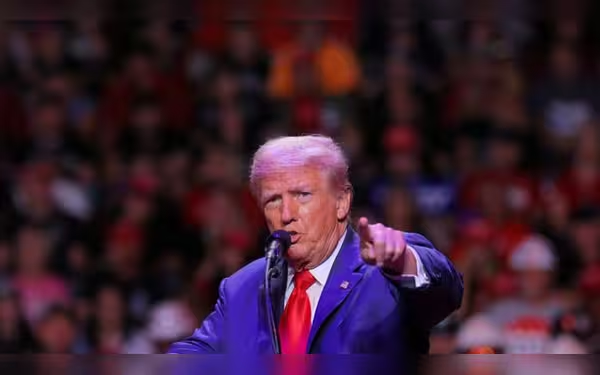Saturday, November 16, 2024 07:52 PM
Trump Claims Zelenskiy Supports Democrats in US Elections
- Trump alleges Zelenskiy favors Democrats' election victory.
- Former president promises a different approach to peace.
- Foreign leaders' influence on US elections raises concerns.
 Image Credits: thenews.com.pk
Image Credits: thenews.com.pkTrump claims Zelenskiy supports Democrats in US elections, emphasizing his own peace plan amid ongoing Ukraine conflict.
In a recent statement, former President Donald Trump made headlines by suggesting that Ukrainian President Volodymyr Zelenskiy is rooting for the Democrats to win the upcoming U.S. elections. This assertion comes amid ongoing discussions about the conflict in Ukraine and the role of U.S. foreign policy in supporting Ukraine against Russian aggression. Trump, who has been vocal about his views on international relations, emphasized that he would approach the situation differently, claiming he has a plan for peace.
Trump's comments reflect a broader narrative in American politics, where foreign leaders often find themselves entangled in domestic electoral battles. The former president stated, "He wants them to win this election so badly but I would do differently - I will work out peace." This statement raises questions about the influence of foreign leaders on U.S. elections and the implications for international diplomacy.
Interestingly, the campaign of Vice President Kamala Harris did not respond immediately to Trump's remarks, leaving many to speculate about the potential impact of such statements on the Democratic campaign. Trump's lack of details regarding his proposed peace plan adds another layer of complexity to the discussion, as voters and analysts alike seek clarity on what a Trump-led approach to peace would entail.
As the U.S. elections draw closer, the intersection of foreign policy and domestic politics will likely become a focal point for candidates. Voters are increasingly aware of how international relations can affect their lives at home, and Trump's comments serve as a reminder of the delicate balance that leaders must maintain when addressing both foreign and domestic issues.
The dynamics of U.S. elections are not just about local issues; they are also influenced by global events and the opinions of foreign leaders. As the political landscape evolves, it is essential for voters to stay informed about how these factors may shape the future of U.S. foreign policy and, ultimately, the world at large. Understanding these connections can empower citizens to make informed decisions at the ballot box.













